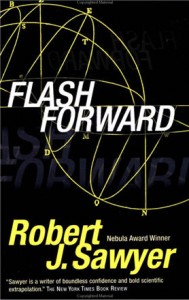 This has nothing to do with The Flash except the title, but I’ve been a fan of Robert J. Sawyer’s novels for several years and figured this site’s audience might still appreciate the review.
This has nothing to do with The Flash except the title, but I’ve been a fan of Robert J. Sawyer’s novels for several years and figured this site’s audience might still appreciate the review.
Flashforward has been in the entertainment news quite a bit the last few weeks with casting for the TV series pilot (more about that later). Strangely enough for a story that’s all about time and the role of the observer, I started reading the novel the day before the first casting news hit.
The novel looks at what happens when, at the moment a scientific experiment begins, everyone on the planet blacks out for two minutes. For those two minutes, everyone sees through the eyes of their future selves, two decades down the line. The world is transformed: first by the millions of accidents caused as drivers, pilots and surgeons lost control of their vehicles and instruments, and second by the survivors’ knowledge of the future.
What follows is an exploration of the nature of time, destiny and free will. Is this a glimpse of the future as it will be, or as it may be? Did the experiment cause the event, or was it a coincidence? Is foreknowledge a blessing or a curse?
Dilemmas
Flashforward is at its best when it focuses on characters’ dilemmas. While it sounds like the TV series will feature a wider cast, the original novel centers on the personal lives of researchers at CERN, particularly the two scientists who designed the experiment: Lloyd Simcoe, a 45-year-old Canadian who is shocked to learn that his impending marriage is doomed to collapse, and Theo Procopides, a 27-year-old Greek who learns that he will be dead by the time the visions come to pass. Lloyd wrestles with his responsibility for the event and whether it’s worth going through with a marriage he knows won’t last. Theo is consumed with preemptively solving his own murder.
